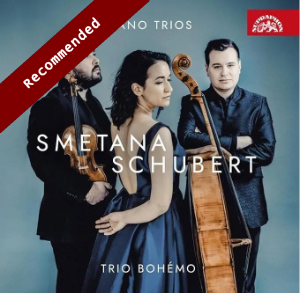
Bedřich Smetana (1824-1884)
Piano Trio in G minor, Op 15 (1855 rev. 1857)
Franz Schubert (1797-1828)
Piano Trio No 2 in E-flat major, D. 929 (1827)
Trio Bohémo
rec. 2024, Britten Studio, Snape Maltings, Snape, UK
Supraphon SU4344-2 [78]
Smetana did not write much chamber music and we owe his Piano Trio to a family tragedy. His eldest daughter, Bedřiška, known as Fritzl, died in 1855 at the age of four of scarlet fever. Her father had thought her gifted musically: she had attended and apparently enjoyed a concert to which he had taken her and which he had conducted. Her death inspired him to write this work. It was first performed in December that year but was coldly received. The next year it was performed again to Liszt, who congratulated Smetana on the work. Smetana revised the work slightly and this, the final version, was first performed on 11 February 1858. However, it was not published until 1880 as Smetana could not earlier find anyone willing to publish it. It is now regarded as a classic of the medium.
There are three movements. It opens with a chromatic solo violin line, clearly a lament, before the other instruments enter. The second subject is a gentle one on the cello. There follows a powerful and very varied sonata form movement with moments of great intensity. The second movement is a scherzo, though not marked as such, with two trios which Smetana calls Alternativos. The first of these features a melody moving between the violin and the cello while the second is fiercer, with dotted rhythms and thick chords. The finale is a Presto interrupted by two episodes, the first melancholy while the second moves into a funeral march. The fast music returns but the work ends abruptly.
As Smetana wrote no other Piano Trio there is no obvious coupling. Some recordings add one of Dvořák’s Piano Trios, of which there are four, but collectors may well prefer to have those in pairs, as indeed they are often recorded. Here we have Schubert’s second Piano Trio, a large work which often takes a whole recording to itself. There are four movements. The opening theme ends with a five note idea which is to dominate the first movement. The second subject is only one theme and there is an extended development section while new material is introduced in the recapitulation. The second movement, marked Andante con moto, does duty for a slow movement while not actually being slow, but in a march-like rhythm like the second movement of the Great C Major symphony. In this Schubert drew on a Swedish folksong which he heard in November 1827. The scherzo is in canon, with one line following the other a bar apart, at first quite strictly and then more freely. The trio features what the Schubert scholar Brian Newbould calls ‘galumphing heaviness,’ which makes a good contrast. The finale is a long movement which the composer was persuaded to cut. It was published in this form in 1828; the full version was not published until 1975 and that is what is performed here. It is in an expanded sonata form, though it begins like a rondo. The second theme is quite enchanting, first played in fast repeated notes, but there is a surprise: before the development the main theme of the slow movement comes back, and this is drawn on several times, including, in an audacious passage – the second of the two passages restored in 1975 – it is combined with the second theme from the finale.
I was very taken with these performances. Trio Bohémo, a Czech team, was formed in 2018 and has been winning prizes in Britain and Europe. They play with both passion but also precision, they listen to one another and they clearly love and enjoy this music. The string players, Matouš Peruška and Kristina Vocetková, can sing and soar, while the pianist, Jan Vojtek, makes light work of Schubert’s often complex and fast-moving piano writing. The recording, made somewhat surprisingly in Britain at Snape Maltings, is clear and has a pleasant bloom. There are, of course, many other recordings of each of these works, but if the coupling appeals, do not hesitate.
Stephen Barber
Buying this recording via a link below generates revenue for MWI, which helps the site remain free


















